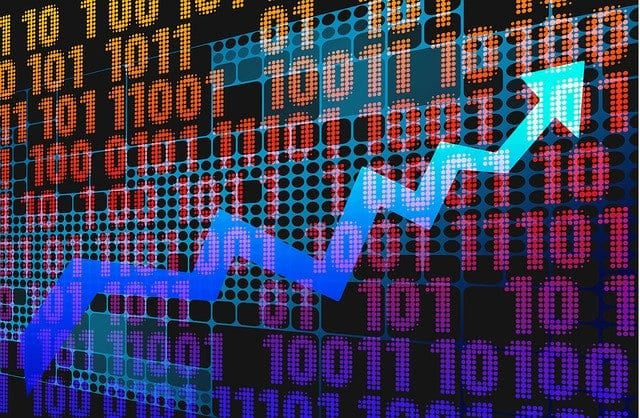
Our May 2023 Investment & Economic Update, looks at how the global investment markets, economy, and commodities perform.
UK Stocks
Our latest monthly investment & economic update for May 2023 showed the FTSE 100 enjoyed a good April, rising 3.1% and bringing its total gain for 2023 to 5.6%.
This means the UK blue-chip index outperformed the US S&P 500 (+1.5%) for the month. However, the US index has risen by 8.6% in 2023, primarily driven by mega-tech stocks that have soared.
The Investment & Economic update for May 2023, showed that while the FTSE 100 rose overall in April, not all its members followed suit. With such a wide variety of stocks in the index, it is unsurprising that only 82 of its 100 shares saw gains this month. These gains ranged from 0.1% to 19.7%, with an average increase of 6.1%.
At the other end of the scale, 18 FTSE 100 losers saw declines ranging from 0.1% to 17.1%, with the average fall being 4%.
US Economy
Economists are warning that the US economy is already in a recession following the publication of official figures revealing that economic activity slowed sharply at the beginning of the year. This is a blow to President Joe Biden’s recently announced re-election campaign.
The US Bureau of Economic Analysis reported that the world’s largest economy grew at an annualised pace of 1.1%.
While the increase in gross domestic product (GDP) was driven by strong consumer spending, it also suggests that the Federal Reserve’s nine consecutive interest rate rises are beginning to drag on growth.
President Biden has announced his intention to run for re-election in 2024, highlighting his efforts to revive the American economy after the pandemic. However, economists predict that a sharp slowdown in business activity in the coming months will hit the economy and that slower hiring will likely make people nervous and put a brake on spending.
Chinese manufacturing
Official data released at the end of April showed that China’s manufacturing activity unexpectedly shrank in April, increasing pressure on policymakers seeking to boost an economy struggling for a post-COVID lift-off amid subdued global demand and persistent property weakness.
While China’s economy grew faster than expected in Q1, thanks to robust services consumption, factory output has lagged due to weak global growth.
The current improvement in demand was cautioned by the Politburo, a top decision-making body of the ruling Communist Party, which stressed that restoring and expanding demand is the key to a durable recovery.
Inflation concern
According to recent Reuters polls of economists, persistently high inflation is the biggest economic concern this year, even as most central banks are at or near the end-game for rate rises. Although most major economies are expected to escape an outright recession or get away with a shallow one, policymakers have their work cut out in taming inflation.
The economists also upgraded their inflation outlook, with median forecasts raised for over two-thirds of the economies polled. They said they were bracing for inflation to exceed their predictions, not fall short of them.
Use the Bank of England Inflation Calculator here
Price inflation-have we seen the highest point read more here
Swiss banking
The Swiss National Bank (SNB) is facing criticism for the concentration of power in the hands of its chairman, Thomas Jordan, and for lacking transparency.
The SNB played a significant role in the state-sponsored rescue of Credit Suisse, making 250 billion Swiss francs ($280 billion) of liquidity available to facilitate its takeover by UBS. Its monetary policy has led to a balance sheet of almost 900 billion Swiss francs, equivalent to 113% of Swiss economic output.
These developments have raised concerns about the concentration of power in the SNB’s three-person governing board overseen by Jordan, which is smaller than the policy-making teams of other major central banks and retains a high level of discretion over its decision-making process.
BoJ review
The Bank of Japan (BOJ) has kept ultra-low interest rates steady and pledged to conduct a review of its past monetary policy. The move lays the groundwork for new Governor Kazuo Ueda to phase out his predecessor’s massive stimulus programme gradually, but maintains a commitment to “patiently” keep policy accommodative.
The central bank removed a pledge from its guidance for interest rates to stay at “current or lower levels,” which gives it more leeway for a future policy tweak.
Bank bail out?
Regulators this week seized First Republic Bank and sold its assets to JPMorgan Chase & Co in a deal to resolve the largest U.S. bank failure since the 2008 financial crisis and draw a line under a lingering banking turmoil.
First Republic saw shares plummet after admitting customers had withdrawn $100bn in deposits in March. The demise of competitor, Silicon Valley Bank, was followed by another US lender, Signature Bank, leading to concerns of a wider banking crisis.
First Republic was among regional U.S. lenders most battered by a crisis in confidence in the banking sector in March, when depositors fled en masse from smaller banks to giants like JPMorgan as they panicked over the collapse of two other mid-sized U.S. banks.
Debt time-bomb
Citizens Advice has raised concerns over a “debt time-bomb,” saying increasing households face a “wild west” when seeking help. The charity reports assisting more people who lack sufficient income to cover essential expenses.
According to Director of Policy Matt Upton, 51% of those with debt issues seen by the charity now have negative budgets, compared with 36% before the pandemic, and there are no signs of the figure coming down. Upton warns that if the trend is mirrored across the UK’s population, it will result in a debt crisis.
Upton added that clients’ use of unsecured credit is at its highest level in four years.
